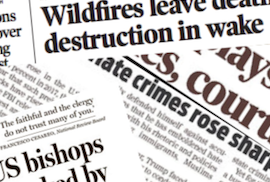President Trump’s new proposal to ensure that free speech is protected by threatening to withdraw federal funding from colleges and universities that fail to protect free speech echoes close to home here on campus. Flyers posted around St. Michael’s recently called upon the campus’s “homophobic administration” to take action on an LGBTQ+ sidewalk proposed last April. As a result, the school formed a free speech committee to help process requests such as the sidewalk, flags, or any other representation that might prove controversial around campus. In an effort to ensure that all speech is protected, this also means protecting hate speech, which falls legally under free speech.
Restricting hate speech means closing the conversation to sometimes uncomfortable and differing opinions. It would confine us to a fear of speaking out against the mainstream for fear of being on the offensive. St. Michael’s
encourages us to live as a community. Part of being a community means a mutual level of respect for the people around you, but it also means the introduction of new ideas despite potential disagreements.In order to maintain free speech we must include all forms of speech, no matter how unpopular the opinion.
A free press must often explore contentious issues, with topics ranging from abortion and sexual assault to slogans like MAGA. A free campus must allow all of those voices to be heard as well.
Risk of losing free speech means risk of losing our power of expression. On a campus of higher education, where we’re supposed to be exploring our opinions and contributing to a conversation that extends far beyond our campus, that would be a very dangerous precedent indeed

